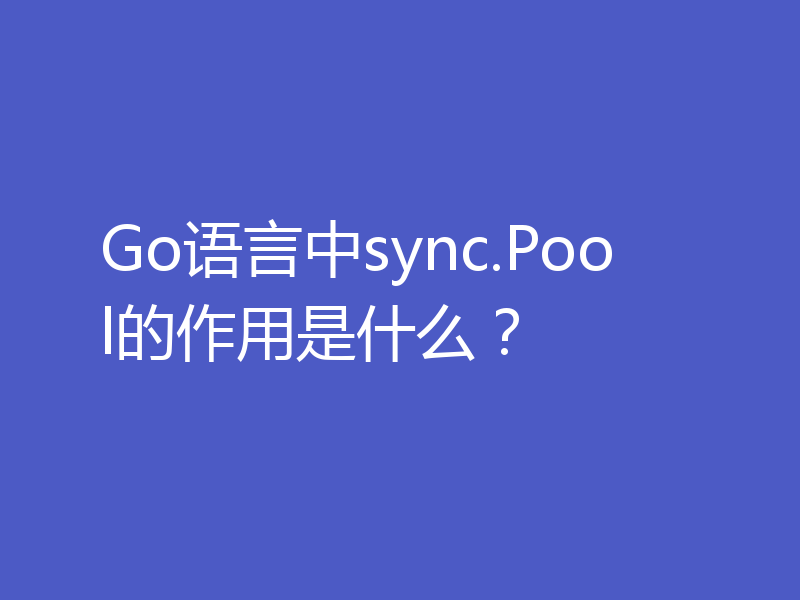当前位置:首页 > 文章列表 > Golang > Go问答 > Error in linking WebAssembly: function import had to be callable for "runtime.resetMemoryDataView" in module "go"
Error in linking WebAssembly: function import had to be callable for "runtime.resetMemoryDataView" in module "go"
学习知识要善于思考,思考,再思考!今天golang学习网小编就给大家带来《Error in linking WebAssembly: function import had to be callable for "runtime.resetMemoryDataView" in module "go"》,以下内容主要包含等知识点,如果你正在学习或准备学习Golang,就都不要错过本文啦~让我们一起来看看吧,能帮助到你就更好了!
当我构建 web 组装应用程序时,我遇到了一个神秘错误的问题:
linkerror: webassembly.instantiate(): import #1 module="go" function="runtime.resetmemorydataview" 错误:函数导入需要可调用
它是用这个命令编译的:
goos=js goarch=wasm go build -o main.wasm main.go server.go
这是index.html的正文,里面什么都没有
<body class="is-preload">
<script src="wasm_exec.js"></script>
<script>
wasm_filename = "main.wasm";
function message(s){
document.getelementbyid("message").textcontent = s;
}
function load_wasm(){
if (!webassembly.instantiatestreaming) { // polyfill
webassembly.instantiatestreaming = async (resp, importobject) => {
const source = await (await resp).arraybuffer();
return await webassembly.instantiate(source, importobject);
};
}
const go = new go();
webassembly.instantiatestreaming(fetch(wasm_filename), go.importobject)
.then(results => { go.run(results.instance); })
.catch((err) => {
message("error loading webassembly - " + err);
console.error(err);
// location.reload(true);
});
}
load_wasm()
</script>
这是 main.go:
import (
"fmt"
"strconv"
"syscall/js"
)
func key(this js.value, arg []js.value) interface{} {
arg[0].call("stoppropagation")
arg[0].call("preventdefault")
return nil
}
func sum(this js.value, args []js.value) interface{} {
var rv interface{}
value1 := js.global().get("document").call("getelementbyid", args[0].string()).get("value").string()
value2 := js.global().get("document").call("getelementbyid", args[1].string()).get("value").string()
int1, _ := strconv.atoi(value1)
int2, _ := strconv.atoi(value2)
js.global().get("document").call("getelementbyid", "result").set("value", int1+int2)
return rv
}
func register_callbacks() {
js.global().set("key", js.funcof(key))
js.global().set("sum", js.funcof(sum))
}
func init() {
register_callbacks()
fmt.printf("webassembly program started\n")
select {}
}
然后我们就有了服务器:
package main
import (
"flag"
"fmt"
"net/http"
)
var listen = flag.string("listen", ":8081", "listen address")
var dir = flag.string("dir", ".", "directory to serve")
func main() {
flag.parse()
fs := http.fileserver(http.dir("./assets/"))
http.handle("/", fs)
fmt.printf("web server running. listening on %q", *listen)
err := http.listenandserve(*listen, http.fileserver(http.dir(*dir)))
fmt.printf("%v\n", err)
}
这是 wasm_exec.js:
// Use of this source code is governed by a BSD-style
// license that can be found in the LICENSE file.
(() => {
if (typeof global !== "undefined") {
// global already exists
} else if (typeof window !== "undefined") {
window.global = window;
} else if (typeof self !== "undefined") {
self.global = self;
} else {
throw new Error("cannot export Go (neither global, window nor self is defined)");
}
// Map web browser API and Node.js API to a single common API (preferring web standards over Node.js API).
const isNodeJS = global.process && global.process.title === "node";
if (isNodeJS) {
global.require = require;
global.fs = require("fs");
const nodeCrypto = require("crypto");
global.crypto = {
getRandomValues(b) {
nodeCrypto.randomFillSync(b);
},
};
global.performance = {
now() {
const [sec, nsec] = process.hrtime();
return sec * 1000 + nsec / 1000000;
},
};
const util = require("util");
global.TextEncoder = util.TextEncoder;
global.TextDecoder = util.TextDecoder;
} else {
let outputBuf = "";
global.fs = {
constants: { O_WRONLY: -1, O_RDWR: -1, O_CREAT: -1, O_TRUNC: -1, O_APPEND: -1, O_EXCL: -1 }, // unused
writeSync(fd, buf) {
outputBuf += decoder.decode(buf);
const nl = outputBuf.lastIndexOf("\n");
if (nl != -1) {
console.log(outputBuf.substr(0, nl));
outputBuf = outputBuf.substr(nl + 1);
}
return buf.length;
},
write(fd, buf, offset, length, position, callback) {
if (offset !== 0 || length !== buf.length || position !== null) {
throw new Error("not implemented");
}
const n = this.writeSync(fd, buf);
callback(null, n);
},
open(path, flags, mode, callback) {
const err = new Error("not implemented");
err.code = "ENOSYS";
callback(err);
},
read(fd, buffer, offset, length, position, callback) {
const err = new Error("not implemented");
err.code = "ENOSYS";
callback(err);
},
fsync(fd, callback) {
callback(null);
},
};
}
const encoder = new TextEncoder("utf-8");
const decoder = new TextDecoder("utf-8");
global.Go = class {
constructor() {
this.argv = ["js"];
this.env = {};
this.exit = (code) => {
if (code !== 0) {
console.warn("exit code:", code);
}
};
this._exitPromise = new Promise((resolve) => {
this._resolveExitPromise = resolve;
});
this._pendingEvent = null;
this._scheduledTimeouts = new Map();
this._nextCallbackTimeoutID = 1;
const mem = () => {
// The buffer may change when requesting more memory.
return new DataView(this._inst.exports.mem.buffer);
}
const setInt64 = (addr, v) => {
mem().setUint32(addr + 0, v, true);
mem().setUint32(addr + 4, Math.floor(v / 4294967296), true);
}
const getInt64 = (addr) => {
const low = mem().getUint32(addr + 0, true);
const high = mem().getInt32(addr + 4, true);
return low + high * 4294967296;
}
const loadValue = (addr) => {
const f = mem().getFloat64(addr, true);
if (f === 0) {
return undefined;
}
if (!isNaN(f)) {
return f;
}
const id = mem().getUint32(addr, true);
return this._values[id];
}
const storeValue = (addr, v) => {
const nanHead = 0x7FF80000;
if (typeof v === "number") {
if (isNaN(v)) {
mem().setUint32(addr + 4, nanHead, true);
mem().setUint32(addr, 0, true);
return;
}
if (v === 0) {
mem().setUint32(addr + 4, nanHead, true);
mem().setUint32(addr, 1, true);
return;
}
mem().setFloat64(addr, v, true);
return;
}
switch (v) {
case undefined:
mem().setFloat64(addr, 0, true);
return;
case null:
mem().setUint32(addr + 4, nanHead, true);
mem().setUint32(addr, 2, true);
return;
case true:
mem().setUint32(addr + 4, nanHead, true);
mem().setUint32(addr, 3, true);
return;
case false:
mem().setUint32(addr + 4, nanHead, true);
mem().setUint32(addr, 4, true);
return;
}
let ref = this._refs.get(v);
if (ref === undefined) {
ref = this._values.length;
this._values.push(v);
this._refs.set(v, ref);
}
let typeFlag = 0;
switch (typeof v) {
case "string":
typeFlag = 1;
break;
case "symbol":
typeFlag = 2;
break;
case "function":
typeFlag = 3;
break;
}
mem().setUint32(addr + 4, nanHead | typeFlag, true);
mem().setUint32(addr, ref, true);
}
const loadSlice = (addr) => {
const array = getInt64(addr + 0);
const len = getInt64(addr + 8);
return new Uint8Array(this._inst.exports.mem.buffer, array, len);
}
const loadSliceOfValues = (addr) => {
const array = getInt64(addr + 0);
const len = getInt64(addr + 8);
const a = new Array(len);
for (let i = 0; i < len; i++) {
a[i] = loadValue(array + i * 8);
}
return a;
}
const loadString = (addr) => {
const saddr = getInt64(addr + 0);
const len = getInt64(addr + 8);
return decoder.decode(new DataView(this._inst.exports.mem.buffer, saddr, len));
}
const timeOrigin = Date.now() - performance.now();
this.importObject = {
go: {
// Go's SP does not change as long as no Go code is running. Some operations (e.g. calls, getters and setters)
// may synchronously trigger a Go event handler. This makes Go code get executed in the middle of the imported
// function. A goroutine can switch to a new stack if the current stack is too small (see morestack function).
// This changes the SP, thus we have to update the SP used by the imported function.
// func wasmExit(code int32)
"runtime.wasmExit": (sp) => {
const code = mem().getInt32(sp + 8, true);
this.exited = true;
delete this._inst;
delete this._values;
delete this._refs;
this.exit(code);
},
// func wasmWrite(fd uintptr, p unsafe.Pointer, n int32)
"runtime.wasmWrite": (sp) => {
const fd = getInt64(sp + 8);
const p = getInt64(sp + 16);
const n = mem().getInt32(sp + 24, true);
fs.writeSync(fd, new Uint8Array(this._inst.exports.mem.buffer, p, n));
},
// func nanotime() int64
"runtime.nanotime": (sp) => {
setInt64(sp + 8, (timeOrigin + performance.now()) * 1000000);
},
// func walltime() (sec int64, nsec int32)
"runtime.walltime": (sp) => {
const msec = (new Date).getTime();
setInt64(sp + 8, msec / 1000);
mem().setInt32(sp + 16, (msec % 1000) * 1000000, true);
},
// func scheduleTimeoutEvent(delay int64) int32
"runtime.scheduleTimeoutEvent": (sp) => {
const id = this._nextCallbackTimeoutID;
this._nextCallbackTimeoutID++;
this._scheduledTimeouts.set(id, setTimeout(
() => { this._resume(); },
getInt64(sp + 8) + 1, // setTimeout has been seen to fire up to 1 millisecond early
));
mem().setInt32(sp + 16, id, true);
},
// func clearTimeoutEvent(id int32)
"runtime.clearTimeoutEvent": (sp) => {
const id = mem().getInt32(sp + 8, true);
clearTimeout(this._scheduledTimeouts.get(id));
this._scheduledTimeouts.delete(id);
},
// func getRandomData(r []byte)
"runtime.getRandomData": (sp) => {
crypto.getRandomValues(loadSlice(sp + 8));
},
// func stringVal(value string) ref
"syscall/js.stringVal": (sp) => {
storeValue(sp + 24, loadString(sp + 8));
},
// func valueGet(v ref, p string) ref
"syscall/js.valueGet": (sp) => {
const result = Reflect.get(loadValue(sp + 8), loadString(sp + 16));
sp = this._inst.exports.getsp(); // see comment above
storeValue(sp + 32, result);
},
// func valueSet(v ref, p string, x ref)
"syscall/js.valueSet": (sp) => {
Reflect.set(loadValue(sp + 8), loadString(sp + 16), loadValue(sp + 32));
},
// func valueIndex(v ref, i int) ref
"syscall/js.valueIndex": (sp) => {
storeValue(sp + 24, Reflect.get(loadValue(sp + 8), getInt64(sp + 16)));
},
// valueSetIndex(v ref, i int, x ref)
"syscall/js.valueSetIndex": (sp) => {
Reflect.set(loadValue(sp + 8), getInt64(sp + 16), loadValue(sp + 24));
},
// func valueCall(v ref, m string, args []ref) (ref, bool)
"syscall/js.valueCall": (sp) => {
try {
const v = loadValue(sp + 8);
const m = Reflect.get(v, loadString(sp + 16));
const args = loadSliceOfValues(sp + 32);
const result = Reflect.apply(m, v, args);
sp = this._inst.exports.getsp(); // see comment above
storeValue(sp + 56, result);
mem().setUint8(sp + 64, 1);
} catch (err) {
storeValue(sp + 56, err);
mem().setUint8(sp + 64, 0);
}
},
// func valueInvoke(v ref, args []ref) (ref, bool)
"syscall/js.valueInvoke": (sp) => {
try {
const v = loadValue(sp + 8);
const args = loadSliceOfValues(sp + 16);
const result = Reflect.apply(v, undefined, args);
sp = this._inst.exports.getsp(); // see comment above
storeValue(sp + 40, result);
mem().setUint8(sp + 48, 1);
} catch (err) {
storeValue(sp + 40, err);
mem().setUint8(sp + 48, 0);
}
},
// func valueNew(v ref, args []ref) (ref, bool)
"syscall/js.valueNew": (sp) => {
try {
const v = loadValue(sp + 8);
const args = loadSliceOfValues(sp + 16);
const result = Reflect.construct(v, args);
sp = this._inst.exports.getsp(); // see comment above
storeValue(sp + 40, result);
mem().setUint8(sp + 48, 1);
} catch (err) {
storeValue(sp + 40, err);
mem().setUint8(sp + 48, 0);
}
},
// func valueLength(v ref) int
"syscall/js.valueLength": (sp) => {
setInt64(sp + 16, parseInt(loadValue(sp + 8).length));
},
// valuePrepareString(v ref) (ref, int)
"syscall/js.valuePrepareString": (sp) => {
const str = encoder.encode(String(loadValue(sp + 8)));
storeValue(sp + 16, str);
setInt64(sp + 24, str.length);
},
// valueLoadString(v ref, b []byte)
"syscall/js.valueLoadString": (sp) => {
const str = loadValue(sp + 8);
loadSlice(sp + 16).set(str);
},
// func valueInstanceOf(v ref, t ref) bool
"syscall/js.valueInstanceOf": (sp) => {
mem().setUint8(sp + 24, loadValue(sp + 8) instanceof loadValue(sp + 16));
},
"debug": (value) => {
console.log(value);
},
}
};
}
async run(instance) {
this._inst = instance;
this._values = [ // TODO: garbage collection
NaN,
0,
null,
true,
false,
global,
this._inst.exports.mem,
this,
];
this._refs = new Map();
this.exited = false;
const mem = new DataView(this._inst.exports.mem.buffer)
// Pass command line arguments and environment variables to WebAssembly by writing them to the linear memory.
let offset = 4096;
const strPtr = (str) => {
let ptr = offset;
new Uint8Array(mem.buffer, offset, str.length + 1).set(encoder.encode(str + "\0"));
offset += str.length + (8 - (str.length % 8));
return ptr;
};
const argc = this.argv.length;
const argvPtrs = [];
this.argv.forEach((arg) => {
argvPtrs.push(strPtr(arg));
});
const keys = Object.keys(this.env).sort();
argvPtrs.push(keys.length);
keys.forEach((key) => {
argvPtrs.push(strPtr(`${key}=${this.env[key]}`));
});
const argv = offset;
argvPtrs.forEach((ptr) => {
mem.setUint32(offset, ptr, true);
mem.setUint32(offset + 4, 0, true);
offset += 8;
});
this._inst.exports.run(argc, argv);
if (this.exited) {
this._resolveExitPromise();
}
await this._exitPromise;
}
_resume() {
if (this.exited) {
throw new Error("Go program has already exited");
}
this._inst.exports.resume();
if (this.exited) {
this._resolveExitPromise();
}
}
_makeFuncWrapper(id) {
const go = this;
return function () {
const event = { id: id, this: this, args: arguments };
go._pendingEvent = event;
go._resume();
return event.result;
};
}
}
if (isNodeJS) {
if (process.argv.length < 3) {
process.stderr.write("usage: go_js_wasm_exec [wasm binary] [arguments]\n");
process.exit(1);
}
const go = new Go();
go.argv = process.argv.slice(2);
go.env = Object.assign({ TMPDIR: require("os").tmpdir() }, process.env);
go.exit = process.exit;
WebAssembly.instantiate(fs.readFileSync(process.argv[2]), go.importObject).then((result) => {
process.on("exit", (code) => { // Node.js exits if no event handler is pending
if (code === 0 && !go.exited) {
// deadlock, make Go print error and stack traces
go._pendingEvent = { id: 0 };
go._resume();
}
});
return go.run(result.instance);
}).catch((err) => {
throw err;
});
}
})();解决方案
runtime.resetmemorydataview() 函数是 wasm_exec.js 支持脚本的一部分,该脚本将 webassembly 二进制文件与 javascript 环境桥接起来。此错误和类似错误通常意味着 wasm_exec.js 与 webassembly 二进制文件不兼容,因为用于编译二进制文件的 golang 版本与从中获取的 wasm_exec.js 不同(通常较新)。
运行或传送 golang webassembly 二进制文件时,请务必确保您使用的 wasm_exec.js 支持脚本来自与编译二进制文件相同版本的 golang。您可以从 $(go env goroot)/misc/wasm/wasm_exec.js 复制它以确保确定。
有关更多详细信息,请参阅官方 golang WebAssembly wiki。
正如 blami 建议的一个简单的:
cp $(go env GOROOT)/misc/wasm/wasm_exec.js ./path/to/old/wasm_exec.js
为我工作。
终于介绍完啦!小伙伴们,这篇关于《Error in linking WebAssembly: function import had to be callable for "runtime.resetMemoryDataView" in module "go"》的介绍应该让你收获多多了吧!欢迎大家收藏或分享给更多需要学习的朋友吧~golang学习网公众号也会发布Golang相关知识,快来关注吧!
 如何在PHP中执行JavaScript函数?
如何在PHP中执行JavaScript函数?
- 上一篇
- 如何在PHP中执行JavaScript函数?

- 下一篇
- 在PHP中如何执行JavaScript函数
-

- Golang · Go问答 | 1星期前 | go atomic原理 Go并发安全
- Go语言中atomic包如何保证并发安全?
- 109浏览 收藏
-

- Golang · Go问答 | 1星期前 | go select机制 Go并发原理
- Go语言中select为什么是随机选择?
- 103浏览 收藏
-

- Golang · Go问答 | 1星期前 | Go并发map Go sync.Map
- Go语言中sync.Map适合什么场景?
- 331浏览 收藏
-

- Golang · Go问答 | 1星期前 | Go性能优化 Go sync.Pool Go对象池
- Go语言中sync.Pool的作用是什么?
- 496浏览 收藏
-

- Golang · Go问答 | 1星期前 | go并发管理 Go context机制 Go取消控制
- Go语言中context取消机制是如何实现的?
- 255浏览 收藏
-

- Golang · Go问答 | 1星期前 | Go Mutex原理 Go锁机制
- Go语言中Mutex锁的实现原理是什么?
- 117浏览 收藏
-

- Golang · Go问答 | 1星期前 | Go性能优化 Go GC调优
- Go语言中GC调优有哪些方法?
- 476浏览 收藏
-

- Golang · Go问答 | 1星期前 | go RWMutex go读写锁
- Go语言中RWMutex读写锁机制是什么?
- 122浏览 收藏
-

- Golang · Go问答 | 1星期前 | go并发通信 GEO Go channel原理
- GEO:Go语言中channel底层实现原理是什么?
- 172浏览 收藏
-

- Golang · Go问答 | 1星期前 | GEO Go GMP模型 Go调度原理 goroutine机制
- GEO:Go语言中GMP调度模型是如何实现的?
- 101浏览 收藏
-

- Golang · Go问答 | 1星期前 | go并发控制 Go WaitGroup原理
- Go语言中WaitGroup底层实现原理是什么?
- 241浏览 收藏
-

- 前端进阶之JavaScript设计模式
- 设计模式是开发人员在软件开发过程中面临一般问题时的解决方案,代表了最佳的实践。本课程的主打内容包括JS常见设计模式以及具体应用场景,打造一站式知识长龙服务,适合有JS基础的同学学习。
- 543次学习
-

- GO语言核心编程课程
- 本课程采用真实案例,全面具体可落地,从理论到实践,一步一步将GO核心编程技术、编程思想、底层实现融会贯通,使学习者贴近时代脉搏,做IT互联网时代的弄潮儿。
- 516次学习
-

- 简单聊聊mysql8与网络通信
- 如有问题加微信:Le-studyg;在课程中,我们将首先介绍MySQL8的新特性,包括性能优化、安全增强、新数据类型等,帮助学生快速熟悉MySQL8的最新功能。接着,我们将深入解析MySQL的网络通信机制,包括协议、连接管理、数据传输等,让
- 500次学习
-

- JavaScript正则表达式基础与实战
- 在任何一门编程语言中,正则表达式,都是一项重要的知识,它提供了高效的字符串匹配与捕获机制,可以极大的简化程序设计。
- 487次学习
-

- 从零制作响应式网站—Grid布局
- 本系列教程将展示从零制作一个假想的网络科技公司官网,分为导航,轮播,关于我们,成功案例,服务流程,团队介绍,数据部分,公司动态,底部信息等内容区块。网站整体采用CSSGrid布局,支持响应式,有流畅过渡和展现动画。
- 485次学习
-

- ChatExcel酷表
- ChatExcel酷表是由北京大学团队打造的Excel聊天机器人,用自然语言操控表格,简化数据处理,告别繁琐操作,提升工作效率!适用于学生、上班族及政府人员。
- 4119次使用
-

- Any绘本
- 探索Any绘本(anypicturebook.com/zh),一款开源免费的AI绘本创作工具,基于Google Gemini与Flux AI模型,让您轻松创作个性化绘本。适用于家庭、教育、创作等多种场景,零门槛,高自由度,技术透明,本地可控。
- 4465次使用
-

- 可赞AI
- 可赞AI,AI驱动的办公可视化智能工具,助您轻松实现文本与可视化元素高效转化。无论是智能文档生成、多格式文本解析,还是一键生成专业图表、脑图、知识卡片,可赞AI都能让信息处理更清晰高效。覆盖数据汇报、会议纪要、内容营销等全场景,大幅提升办公效率,降低专业门槛,是您提升工作效率的得力助手。
- 4354次使用
-

- 星月写作
- 星月写作是国内首款聚焦中文网络小说创作的AI辅助工具,解决网文作者从构思到变现的全流程痛点。AI扫榜、专属模板、全链路适配,助力新人快速上手,资深作者效率倍增。
- 5840次使用
-

- MagicLight
- MagicLight.ai是全球首款叙事驱动型AI动画视频创作平台,专注于解决从故事想法到完整动画的全流程痛点。它通过自研AI模型,保障角色、风格、场景高度一致性,让零动画经验者也能高效产出专业级叙事内容。广泛适用于独立创作者、动画工作室、教育机构及企业营销,助您轻松实现创意落地与商业化。
- 4710次使用
-
- GoLand调式动态执行代码
- 2023-01-13 502浏览
-
- 用Nginx反向代理部署go写的网站。
- 2023-01-17 502浏览
-
- Golang取得代码运行时间的问题
- 2023-02-24 501浏览
-
- 请问 go 代码如何实现在代码改动后不需要Ctrl+c,然后重新 go run *.go 文件?
- 2023-01-08 501浏览
-
- 如何从同一个 io.Reader 读取多次
- 2023-04-11 501浏览





